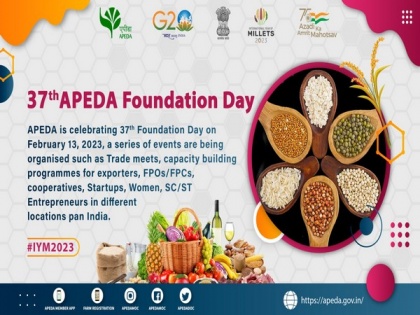1986 to 2023: Here's agricultural trade body APEDA's growth story
By ANI | Published: February 13, 2023 05:47 PM2023-02-13T17:47:15+5:302023-02-13T23:20:02+5:30
The Agricultural and Processed Food Products Export Development Authority (APEDA), which works under the Ministry of Commerce and Trade, ...

1986 to 2023: Here's agricultural trade body APEDA's growth story
The Agricultural and Processed Food Products Export Development Authority (APEDA), which works under the Ministry of Commerce and Trade, has achieved phenomenal success in the promotion of the export of agricultural products since its inception in 1986.
The Ministry of Agriculture and Farmers Welfare on Monday put out a statement highlighting the initiatives and milestones of APEDA in the trade of India's agricultural produce.
Starting with a merely USD 0.6 billion export in 1987-88, the export development authority's intervention took the export of agricultural products to a new height of USD 19.69 billion till April-December 2022-23, and expanded the export basket to over 200 countries, it said.
In 2021-22, the exported agricultural products were worth USD 24.77 billion, the statement said.
The target given to APEDA in the current financial year (2022-23) is USD 23.56 billion, out of which 84 per cent -- USD 19.69 billion has been achieved till December 2022, and the remaining target is expected to be completed within the stipulated time period.
According to the WTO Trade Data, India was ranked at 25th in 1986, which slipped further to 28th in 1987 and 29th position in 1988. However, the ranking of India improved significantly as the county's position moved to 10th rank in 2019 which improved further to 9th position in 2020 and 8th rank in 2021.
Aiming to take the export of agricultural products to a new level, APEDA promoted IT-enabled activities for ease of doing business in the promotion and development of exports from India.
Keeping in mind Prime Minister Narendra Modi's call for 'vocal for local' and 'Atmanirbhar Bharat', APEDA has been focusing on the promotion of exports of locally sourced GI (Geographical Indications) tagged as well as indigenous, ethnic agricultural products. New products and new export destinations have been identified and accordingly, various trial shipments have been facilitated.
As on date, there are 417 registered GI products and of them, around 150 GI tagged products are agricultural and food GI out of which more than 100 registered GI products fall under the category of APEDA scheduled products (cereals, fresh fruits and vegetables, processed products), the statement said.
Some of the ethnic and GI-tagged products exported by India include dragon fruit, patented village rice, jackfruit, jamun, Burmese grapes, dehydrated mahua flowers, and puffed rice. GI varieties of mango, GI-tagged shahi litchi, bhalia wheat, Madurai malli, king chilli, mihidana, sitabhog, dahanu gholvad sapota, Jalgaon banana, Vazhakulam pineapple, marayoor jaggery, Khasi mandarin (GI) from Meghalaya, etc.
The Agriculture Export Policy stepped in as an Institutional mechanism in 2018 for the promotion of agricultural exports in the States for the first time with a focus on agriculture export-oriented production, export promotion, better farmer realization and synchronization with the policies and programmes of the Government of India laying emphasis on farmer-centric approach.
A Market Intelligence Cell has been constituted in APEDA and the activity of dissemination of E-market intelligence reports comprising detailed market analysis has commenced.
The agri exports from the Himalayan belt, J&K to Ladakh were an achievement in the development of the region with regard to agri exports. The landlocked states such as the northeastern region, Uttar Pradesh, Uttarakhand, Bihar, and Madhya Pradesh spurred in agri exports when their products were sourced from farmers and displayed in the retail chains of importing countries.
Non-basmati rice has emerged as India's top export item among the many agricultural and processed food product exports under the APEDA basket. With the export of USD 4,663 million in nine months of 2022-23, it has recorded a significant contribution in the current fiscal. Other top products in the APEDA export basket in 2022-23 are basmati rice, cereal preparations and miscellaneous processed items and meat, dairy and poultry products.
Over the years, APEDA has been handling issues concerning product safety, quality and global promotion for all its product categories, compromising more than 700 products.
With the agricultural awareness about environmental and food safety issues in the importing countries and constantly additional food norms and consumer preferences, APEDA has constantly been sensitizing its trade exporters about export requirements and also providing assistance for setting up of infrastructure facilities for common uses and as well as by the concerned member exporters for having export-oriented production from the country.
Considering the importance of food safety and traceability required by the importing countries of developed economies, APEDA took a number of initiatives in the area of quality development such as the preparation of standards, procedures for identified potential products, development of residue monitoring protocol, recognition of laboratories and implementation of traceability systems.
( With inputs from ANI )
Disclaimer: This post has been auto-published from an agency feed without any modifications to the text and has not been reviewed by an editor
Open in app